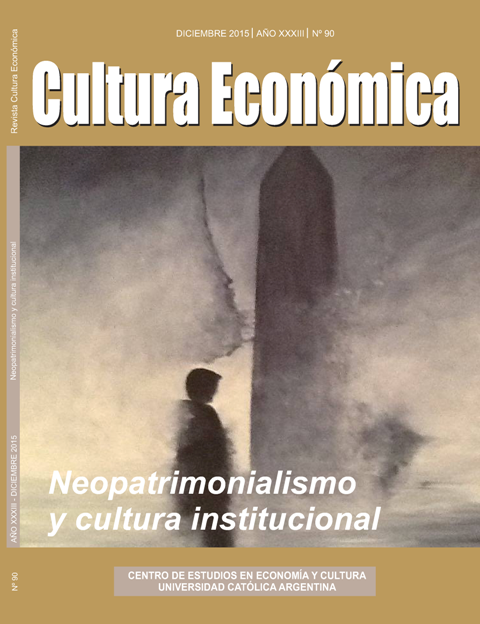Neopatrimonialism and Patronage-Clientelism. A Thematic Review of Literature
Keywords:
NEOPATRIMONIALISM, PATRONAGE, CLIENTELISM, LATIN AMERICA, INSTITUTIONSAbstract
The paper examines Neopatrimonialism current context of re-emergence, its definitions, features and socio-economic consequences, from various scholars who have addressed this subject. Then, connections and differences between Neopatrimonialism and Patronage-Clientelism are identified. Exploring these systems of institutional organization, widely rooted in Latin America, is essential to understand the region’s present problems and to foresee its possible solutions.Downloads
References
Acemoglu, Daron y James Robinson (2012). Why Nations Fail? The Origins of Power, Prosperity, and Poverty. Crown Business, New York.
Auyero, Javier (2000). Poor People ‘s Politics: Peronist Networks and the Legacy of Evita Durham, Duke University Press.
Bratton, Michael y Nicolas van de Walle (1994). "Neopatrimonial Regimes and Political Transitions in Africa", World Politics, N° 46.
Bremmer, Ian (2009). "State Capitalism Comes of Age", Foreign Affairs, Vol. 88, Issue 3.
Brinkerhoff, Derick W., y Arthur Goldsmith (2002). "Clientelism, Patrimonialism and Democratic Governance: An Overview and Framework for Assessment and Programming", U.S. Agency for International Development Office of Democracy and Governance.
http://www.abtassociates.com/reports/2002601089183_30950.pdf Ultimo acceso: julio 2015.
Buchanan, James M. (1980). "Rent seeking and profit seeking", en James M Buchanan, Robert D. Tollison, y Gordon Tullock (eds.) Toward a theory of the rentseeking society. College Station, Texas A & M University Press, Texas.
Clapham, Christopher (1982). "Clientelism and the State", en Clapham, Christopher (ed.), Private Patronage and Public Power. Political Clientelism in the Modern State. London, Frances Pinter.
Eisenstadt, S. N. y Louis Roniger (1980). "Patron Client Relations Structuring Social Exchange," en Comparative Studies in Society and History, Vol. 22, N° 1, Cambridge University Press.
Erdmann, Gero y Ulf Engel (2006). "Neopatrimonialism Revisited. Beyond a Catch-All Concept," en GIGA Research Program, Legitimacy and Efficiency of Political Systems, N° 16.
Ermakoff, Ivan (2011). "Patrimony and Collective Capacity: An Analytical
Outline," en The Annals of the American Academy of Political and Social Science, Vol. 636, "Patrimonial Power in the Modern World".
Fukuyama, Francis (2011). "The Origins of Political Order, From Pre-human Times to the French Revolution". New York, Farrar, Straus and Giroux.
Gordin, Jorge P. (2006). "La Sustentabilidad política del clientelismo: teoría y observaciones empíricas en América Latina", en América Latina, N° 13, CIDOB, Barcelona.
Graziano, Luigi (1976). "A Conceptual Framework For The Study of
Clientelistic Behavior", en European Journal of Political Research N°4.
Günay, Sevgi (2008). "Clientelism and Weberian Values of Bureaucracy,"
artículo presentado en NIG Annual Work Conference 2008, Panel 1: "Public Values, The Next Step", Universidad de Enschede, Twente, Holanda.
Krueger, Anne O. (1974). "The Political Economy of the Rent-seeking Society", en American Economic Review, Vol. 64, N° 3.
Lachmann, Richard (2011). "Coda: American Patrimonialism: The Return of the Repressed," en The Annals of the American Academy of Political and Social Science, Vol. 636, "Patrimonial Power in the Modern World".
Landé, Carl H. (1983). "Political Clientelism in Political Studies. Retrospect and Prospects", en International Political Science Review, N°4.
Lemarchand, Rene, y Keith Legg (1972). "Political Clientelism and Development: A Preliminary Analysis", en Comparative Politics, Vol. 4, N° 2.
Médard, Jean-Francois (1996). "Patrimonialism, Neo-Patrimonialism
and the Study of the Post-colonial State in Subsaharian Africa", en Marcussen, Henrik Secher (ed.) Improved Natural Resource Management – the Role of Formal Organizations and Informal Networks and Institutions. International Development Studies, Roskilde University, Roskilde.
North, Douglass C. (1990). "Institutions, Institutional Change and Economic Performance". New York, Cambridge University Press.
Olson, Mancur (1993). "Dictatorship, Democracy and Development", en The American Political Science Review N° 87(3).
Putnam, Robert, Robert Leonardi y Raffaella Y. Nanetti. (1993). Making democracy work: Civic traditions in modern Italy. Princeton, Princeton University Press.
Resico Marcelo F. (2013). "A debate on models of capitalism and the Social Market Economy", Konrad Adenauer Foundation. http://
bibliotecadigital.uca.edu.ar/repositorio/investigacion/debate-modelscapitalism-resico.pdf. Ultimo acceso: julio 2015.
Resico, Marcelo F (1998). "El capitalismo y el desencantamiento del mundo. Un estudio de la filosofía de la economía de Max Weber", en Revista Valores en la Sociedad Industrial N° 42.
Roniger, Louis (1994). "Civil Society, Patronage and Democracy", en
International Journal of Comparative Sociology N° 35: (3/4).
Roniger, Louis (2004). "Political Clientelism, Democracy and Market Economy", en Comparative Politics, Vol. 36, N° 3.
Roth, Günther (1968). "Personal Rulership, Patrimonialism, and Empire-Building in the New States", en World Politics, N° 20.
Rudolph, Lloyd I., y Susanne Hoeber Rudolph (1979). "Authority and Power in Bureaucratic and Patrimonial Administration: A Revisionist
Interpretation of Weber on Bureaucracy", en World Politics, Vol. 31,
N° 2.
Tollison, Robert D. (1982). "Rent seeking: A survey", en Kyklos N° 35.
Van Gool, Bas y Daan Beekers (2010). "From Patronage to Neopatrimonialism. Confronting the "Good Governance"
Orthodoxy in the Postcolony", artículo presentado en la Critical Governance Studies Conference, Warwick University, Reino Unido.
Weber, Max ([1968] 1978). Economy and Society. An Outline of Interpretative Sociology. New York, Bedminster Press.
Downloads
Published
How to Cite
Issue
Section
License













